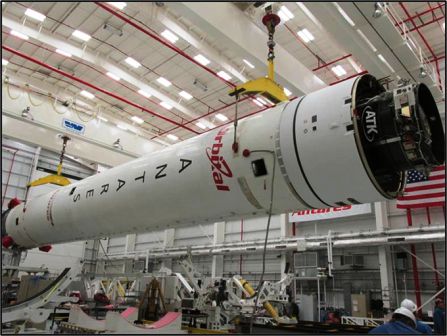Orb-1 COTS, Orbital Science Corporation’s first commercial supply flight to the International Space Station (ISS), has been postponed twice from an original Jan. 7, 2014 launch date. Cold temperatures on the ground and increased solar activity have derailed back-to-back attempts this week, but Orbital is giving it another launch try on Jan. 9.
The Orb-1 mission will use an Orbital Antares rocket to put the company’s Cygnus cargo spacecraft into low earth orbit for a three day trip to ISS, where it will be berthed and deliver nearly 1,500 kilograms of cargo to the station, including fresh food, scientific experiments, children’s books to be read in orbit and an ant farm.
Orbital’s Jan. 7 attempt was moved to Jan. 8 due to the infamous “Arctic Vortex” cold weather that brought overnight temperatures on the Eastern Shore to single digits and Jan. 7 morning temperatures between 14 to 17 degrees F. The Antares rocket has a low temperature safety limit of 20 degrees F, ruling out any launch attempt for Jan. 7.
Low temperatures did not stop Orbital from preparing Antares for a flight attempt early on the afternoon of Jan. 8, but preparations had to include measures to protect personnel working in the cold. A mixture of frequently rotating outside ground crew between the rocket and trucks with the heaters turned up to the max was used to keep people safe and working effectively.

Image via Orbital.com
Early on the morning of Wednesday, Jan. 8, Orbital put off its afternoon launch attempt due to increased space radiation levels. A massive sunspot cluster kicked out a solar flare on Tuesday, releasing a massive amount of particles streaming toward earth. Orbital engineers and subject matter experts in space weather ran numerous models to examine the potential for problems and ultimately decided to postpone the launch.
While the Cygnus spacecraft itself would not be affected by any solar event, concerns about the rocket’s avionics lead to the postponement. Orbital Chief Technical Officer Antonio Elias said “like global warming” there has been increased concern about space weather causing a mission failure, due to excess protons triggering a computer glitch or chip failure in critical systems. A millisecond loss of control in either of the Antares first or second stage avionics suites would likely lead to loss of the rocket and the Cygnus spacecraft.
As of 5:30 p.m. ET on Wednesday, Orbital decided to make a third launch attempt for 1:07 p.m. ET on Thursday, Jan. 9.
After Orb-1, two more Orbital cargo delivery missions are expected to take place this year in May and October, followed by an additional five flights by 2016. If all three 2014 flights are successfully executed, Orbital should delivery around 4,500 kilograms of supplies to ISS by the end of the year. Orb-1 was originally scheduled to take place in late December with the vehicle rolled out to the launch pad before NASA postponed the mission in order to fix a balky radiator onboard the station.
Even if the Orb-1 launch doesn’t take place tomorrow, Orbital still has had a good week. Wednesday, the White House announced it would support operating ISS through 2024. Orbital is one of two U.S. commercial vendors certified to deliver supplies to the International Space Station, so it should have plenty of business in the years to come.
Edited by Alisen Downey
View all articles
 Internet Telephony Magazine
Click here to read latest issue
Internet Telephony Magazine
Click here to read latest issue CUSTOMER
CUSTOMER  Cloud Computing Magazine
Click here to read latest issue
Cloud Computing Magazine
Click here to read latest issue IoT EVOLUTION MAGAZINE
IoT EVOLUTION MAGAZINE




